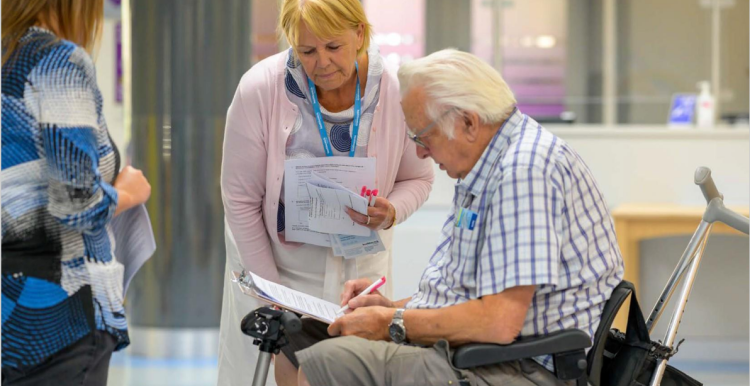Update: the North Central London Integrated Care System and Barnet Borough Partnership

Healthwatch Barnet was delighted that Colette Wood, Director of Integration, Barnet was able to attend our public event on the new ICS to give an update and answer your questions.
Also on our panel was Conan Cowley, Senior Primary Care Transformation Manager, who provided an update on forthcoming changes to the GP Enhanced Access Service. Thanks too to Martin Emery and Lizzie Stimpson, Senior Engagement Managers, for explaining all important plans for involving local people.
You can watch the full event on our YouTube channel but here’s a short report. If there’s anything you would like to add, drop an email to Healthwatch Barnet.
Colette opened the session with an overview of the ICS, illustrated by a set of Powerpoint slides (see below). The ICS unites all health and social care services in North Central London. The pandemic highlighted the benefits of this kind of co-operation, and it’s now been moved onto a statutory footing. While the ICB is responsible for allocating the NHS budget, the new NCL Health and Care Partnership determines strategy. A new Barnet Borough Partnership brings together local authorities, voluntary and community organisations, NHS trusts plus Healthwatch Barnet, representing local people. On a neighbourhood level, activity will centre on seven Primary Care Networks, each with multi-disciplinary teams.
The ICB is concerned not just with health care, but the wider determinants, e.g. housing, the aim being to tackle the health inequalities exposed by the pandemic.
Colette was keen to stress that community involvement and representation is key, e.g. local people are invited to join the Health and Wellbeing Board and patients will be actively involved in the co-production of the mental health transformation plan.
The voluntary sector will be integral to the Barnet Borough Partnership, set up to improve the health and wellbeing of Barnet people. Colette highlighted the early success of the new Barnet Innovation Fund: 31 local community projects are underway (and the scheme just missed out on an award!).
Areas of focus include care for the frail and elderly to prevent hospitalisation; holistic support for families and young children; cardiovascular care (the biggest cause of premature death). Colette highlighted too work around mental health, particularly targeted at addressing inequalities in mental health for young black men.
Slide presentation ICS event
Thanks to Colette and her team for the detailed slides which you can see below.
Colette then took questions.
Janice asked if the Primary Care Group could be a part of the Barnet Borough Partnership as much of their work aligns with what the BBP is doing. Colette will discuss this with the Chair and Deputy.
Asmina raised the issue of recruitment and issues of confidentiality. Colette acknowledged the importance of this.
Susan asked about the involvement of groups such as hospice services and pharmacy services. Colette explained that the partnership is still evolving and discussions are needed about how to include hospices. Much of the focus of BBP has been on Primary Care but pharmacies come under the ICB. Primary Care Networks have good links with pharmacies but there are opportunities to do more.
Maria raised the issue that the Barnet Council website is not user friendly. She also reported that her GP service had informed her of forthcoming changes to the Enhanced Access Service and requested that more information be made available to the public.
Colette promised to pass on the feedback on the website. Changes to the Enhanced Access Service was the next item on the agenda.
Michael, who is sight impaired, raised the importance of having text versions of everything to send to partially sighted users so that they can access the information fully.
Sue wanted to know how changes to access to GPs are being communicated, and how patients can know how to access the correct part of the primary care service.
Colette agreed that access is a big issue. A review is underway.
Janice commented that pre-pandemic PCNs were specialising in particular areas and then sharing their expertise across the borough. Will this continue? Colette confirmed that this work is being scaled up eg. frailty MDT, dementia etc. Janice wanted to know how these services will be communicated to patients. She also raised the issue of some GP surgeries refusing to have PPGs (Patient Participation Groups) though not all of them. Colette will take this up with the GP cabinet.
Colette had to leave at this point but thanked everyone for their helpful comments.
She handed over to Conan Cowley who gave an update on GP Enhanced Access Service.
From October, Primary Care Networks (groups of local GP practices who work together) will become responsible for providing the patients in their area with ‘enhanced access’ appointments. Also known as ‘out of hours’ appointments, ‘enhanced access’ is the provision of appointments outside of a GP practice’s core hours of 8am to 6.30pm (e.g. evenings and Saturdays).
Conan stressed that there will be no reduction in the hours available with a total of 48,000 appointments available annually; capacity, locations, the type of appointment offered, and the staff you will see – all will stay the same. However, appointments on Sundays and Bank Holidays will no longer be available (this is in line with services across the UK).
These appointments will be pre-bookable and can be made for regular appointments e.g. monitoring or screening.
The introduction of a new telephone booking service should result in improvements too.
Conan invited questions from the audience.
Susan said she had no idea that the EAS service was available and suggested that staff working on reception desks in practices need to be made aware of this service and encouraged to share the details.
Conan said that there will be more digital promotion plus more joint activity with Healthwatch, Barnet Health Champions and other organisations across the borough. Practice receptionists are crucial to this, particularly for older people who are not online.
Derrick suggested ways to promote the information e.g via newsletters across the borough such as PTAs in schools, religious groups.
Ying pointed out the importance of written material as not everyone is digitally literate.
Howard felt that Barnet Council communications are improving e.g they sent out advice about heat wave, while there was nothing from the NHS.
Lizzie Stimpson, Senior Engagement Manager, then talked through plans to engage local communities and raise local voices. The intention is to move to a model of shared decision making, working with people rather than issues. She stressed the need to have a range of ways to hear from people whether it’s online, face-to-face, or via surveys. Working closely with the voluntary sector will also be key, as organisations are out and about in boroughs and across NCL and aware of issues that need to be picked up.
Finally, Martin Emery supplied an update on the Residents’ Health Panel, the online engagement hub. There are currently just under 1,000 active participants (across North Central London) but Martin would like to double that. He encouraged anyone interested in joining to sign up.

